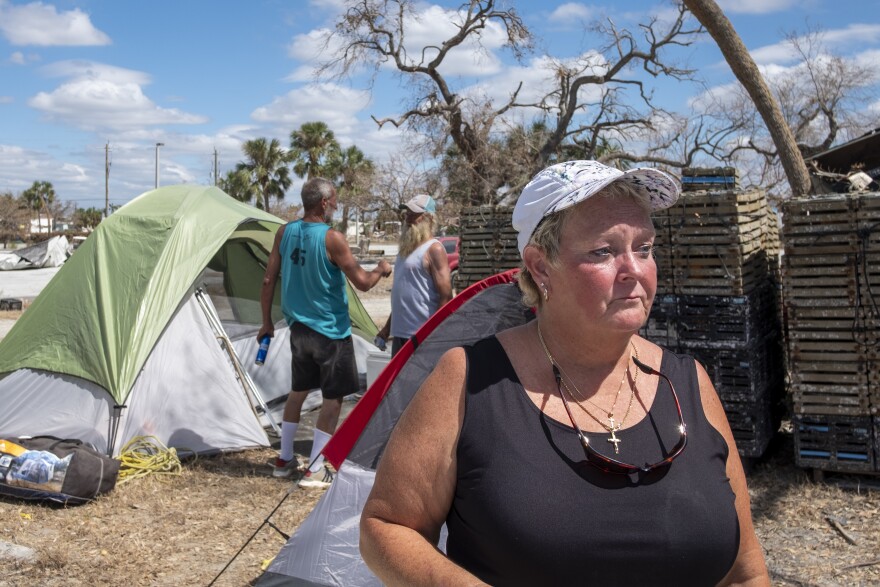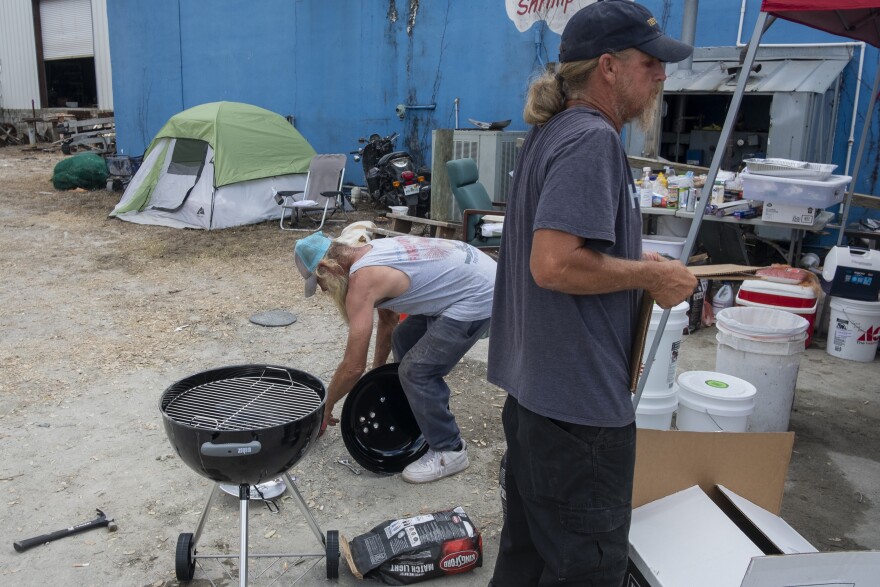Hurricane Ian made landfall in Southwest Florida as one of the strongest storms ever recorded to hit the United States.
Aid and rescue operations reached the region shortly after. But on San Carlos Island, which sits between Fort Myers Beach and the mainland, some residents feel overlooked as relief efforts continue.
More than a week and a half after Ian passed, nearly all of the island’s shrimp boats remained on top of nearby houses or tangled in the rigging of other ships. The Gulf of Mexico’s largest commercial shrimping port is all but paralyzed.
Most fishermen on San Carlos Island weathered the storm on their boats, which often serve as their homes as well. A number were injured, and storm surge destroyed much of the island’s fishing infrastructure and equipment.
When the water receded and they were able to make it down to land, help had yet to arrive.

A nurse named Sandy — who asked WLRN not to use her full name — was one of the first to start helping. She criticized officials for only trying to enforce evacuation orders ahead of the storm, saying they had not come to offer aid since then.
“Don’t come down here and say, ‘Oh we’re offering you shelter, if you don’t want it, we’re leaving.’ These people ain’t leaving, so you gotta figure out a way to take care of them,” she said.
Sandy has become the de facto leader of the groups of citizen volunteers who arrive on Shrimpboat Lane with food, water and clothing.
She arrived on the island after the storm to check on a shrimper who had been one of her patients. He was discharged from a hospital after receiving care for an injury he suffered while riding out the storm.
Hey, white collar, blue collar, no collar - a lot of us live off the grid, but we’re still humans, man... We lost everything, and people are driving by like we’re not down here.'Sandbar' Dave Hutchins
One of the three seafood markets has become a staging area for donations and displaced shrimpers. Many of them sleep in tents next to stacked crab traps and a sputtering generator.
Three volunteers showed up with charcoal, two grills and a bottle of lighter fluid. Manning the grills were ‘Sandbar’ Dave Hutchins, who worked on the Lexie Joe, and his younger sister, Brenda. They said any food donations came from those who live more inland.
“A friend of ours called us and we told her what was going on. In less than 18 hours she came pulling up with a caravan of people,” he said. “They started breaking out tables for a buffet, clothes and water, and these are just individual people. We still basically haven’t seen an official down here.”

“The devastation of all the cities and all the islands, that’s what kills me. I feel like I’m on a set at Universal Studios,” Brenda said.
Among many of the issues on the island is the lack of usable bathrooms, forcing those who remain to use buckets instead.
Unfulfilled promises of a portable toilet delivery has led to tension and even competition between fishermen.
“When you sit there up at the little store for 20 minutes and you see 200 hundred porta-johns go across [to] the beach … You know, come on, we just need four or five. We’re going to start having a really bad health issue down here,” Dave said.
When asked what happens to the buckets, he replied, “I really don’t want to tell you, man, because you don’t want to know. But we’re doing what we’ve got to do — you’ve got 150 people down here and we’ve been in this situation since the day after the storm."
Across Matanzas Pass is Fort Myers Beach, a seasonal tourist destination whose restaurants boast a species of shrimp only found in the Gulf of Mexico. It’s known locally as “pink gold”.

Every spring, the town government sponsors its own weeklong festival to celebrate the catch and its contribution, both economically and culturally. Despite that, those on the other side of the bridge feel neglected.
“Hey, white collar, blue collar, no collar — a lot of us live off the grid, but we’re still humans, man. But they look down here and they see the boats. We lost everything, and people are driving by like we’re not down here. Y’all love the seafood and everything, but what about us?”
Still, the shrimpers are determined to continue fishing despite the challenges they face on land.
Captain Logan runs one of the three fishing boats that survived the storm. He admitted he was lucky, and that he planned on heading out the next morning to continue fishing.









